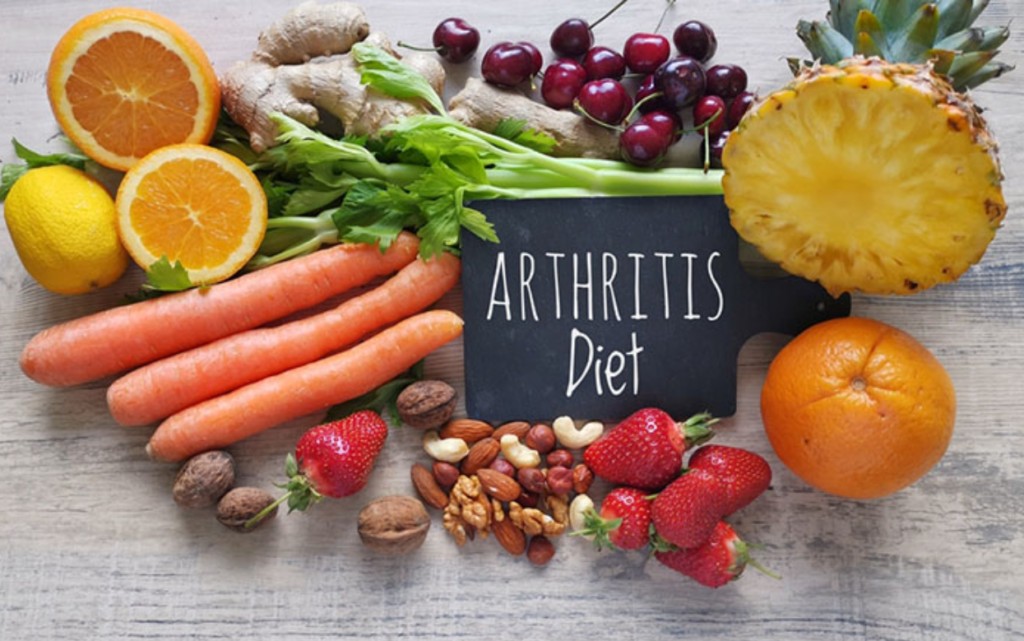Arthritis, a condition affecting millions worldwide, can significantly impact daily life.(1) Managing arthritis often involves various treatments, with diet playing a crucial role. This article delves into the Arthritis Diet, outlining its benefits, foods to eat and avoid, and practical tips for those navigating this condition.(2)
Arthritis Diet: Unlocking the Benefits for Joint Health
Arthritis sufferers often seek dietary solutions to alleviate symptoms. The Arthritis Diet focuses on foods that reduce inflammation, strengthen bones, and boost overall health. By incorporating specific foods and avoiding others, individuals can experience a notable improvement in their symptoms.
Key Nutrients for Arthritis Management
Nutrients like omega-3 fatty acids, antioxidants, and vitamins play a significant role in managing arthritis. Foods rich in these nutrients can help reduce inflammation and pain, offering a natural approach to symptom relief.
The Best Foods for Arthritis
Fruits, vegetables, whole grains, and lean proteins are staples in the Arthritis Diet. These foods provide essential nutrients and help maintain a healthy weight, reducing stress on joints.
Foods to Avoid in Your Arthritis Diet
Certain foods can exacerbate arthritis symptoms. Processed foods, high-sugar items, and excessive salt should be limited to reduce inflammation and manage arthritis more effectively.
Anti-Inflammatory Foods: A Game-Changer
Incorporating anti-inflammatory foods into your diet can significantly impact arthritis management. Foods like berries, nuts, and leafy greens are known for their anti-inflammatory properties.
RELATED ARTICL : THE SIRTFOOD DIET GUIDE
Whole Grains for Joint Health
Whole grains are an excellent source of fiber and nutrients. Including whole grains in your diet can help reduce inflammation and improve overall joint health.
The Role of Hydration in Arthritis
Staying hydrated is crucial for overall health, especially for those with arthritis. Proper hydration helps maintain joint lubrication and function.
Omega-3 Fatty Acids: A Key Component
Omega-3 fatty acids, found in fish and certain nuts, are known for their anti-inflammatory effects. Regular consumption can help reduce arthritis symptoms.(3)
Calcium and Vitamin D for Strong Bones
Calcium and Vitamin D are essential for bone health. Dairy products, leafy greens, and fortified foods are excellent sources of these nutrients.
Balancing Proteins in Your Diet
Protein is vital for muscle health and recovery. Balancing protein intake with plant-based and lean animal sources can benefit those with arthritis.
Herbs and Spices: Natural Solutions for Pain Relief
Certain herbs and spices, like turmeric and ginger, have natural anti-inflammatory properties. Incorporating these into your diet can offer natural pain relief.
Navigating Sugar and Processed Foods
Reducing sugar and processed food intake is crucial for managing arthritis. These foods can increase inflammation and worsen symptoms.
The Impact of Alcohol and Caffeine
Alcohol and caffeine can have adverse effects on arthritis. Moderating consumption of these substances is recommended for better arthritis management.
Practical Meal Planning Tips

Planning meals ahead of time can help ensure a balanced, arthritis-friendly diet. Preparing meals at home allows for better control over ingredients and portion sizes.
Supplements and Vitamins: Enhancing the Arthritis Diet
While a balanced diet is key, supplements and vitamins can provide additional support. Consulting a healthcare professional is essential before adding supplements to your diet.
Debunking Diet Myths Around Arthritis
Many myths surround arthritis and diet. Understanding the facts can help individuals make informed dietary choices for better management of their condition.
Lifestyle Changes for Arthritis Management
Diet is just one aspect of managing arthritis. Incorporating exercise and stress management techniques can further enhance the benefits of the Arthritis Diet.
The Journey to Starting an Arthritis Diet
Transitioning to an Arthritis Diet can be challenging. Starting with small, manageable changes can make the process more achievable.
Success Stories and Real-Life Examples
Hearing from individuals who have successfully managed arthritis through diet can be inspiring. These stories provide practical insights and motivation.
Expert Opinions and Research Findings
Recent research and expert opinions offer valuable information on the effectiveness of diet in managing arthritis. Staying informed can help individuals make better dietary choices.
Overcoming Challenges in Diet Adherence
Sticking to an Arthritis Diet can be difficult. Finding support and creating a sustainable plan are key to overcoming these challenges.
Understanding the Benefits of an Arthritis Diet
An arthritis diet isn’t just about eating specific foods; it’s a holistic approach to managing the condition. A diet tailored for arthritis can lead to reduced inflammation, decreased pain, and improved joint function. It can also contribute to weight management, which is crucial since excess weight puts additional strain on the joints.
The Power of Anti-Inflammatory Foods
Inflammation is a key contributor to arthritis pain and stiffness. Incorporating anti-inflammatory foods like fatty fish, nuts, seeds, and leafy greens can help reduce these symptoms. These foods are rich in omega-3 fatty acids and antioxidants, which are known for their inflammation-fighting properties.
Why Some Foods Worsen Arthritis Symptoms
It’s important to understand that certain foods can exacerbate arthritis symptoms. Processed foods, red meat, and foods high in sugar can increase inflammation in the body. Avoiding or limiting these foods can significantly benefit individuals with arthritis.
The Impact of Dairy and Gluten in Arthritis
Dairy and gluten are often debated in the context of arthritis. While they’re not inherently bad, some people may find that these food groups worsen their symptoms. It’s advisable to monitor how your body reacts to these foods and adjust your diet accordingly.
Integrating Fruits and Vegetables into Your Diet
A diet rich in fruits and vegetables is beneficial for everyone, especially those with arthritis. These foods are high in nutrients and antioxidants, which support overall health and help combat inflammation.
The Importance of a Balanced Diet in Arthritis Management
A balanced diet is crucial in managing arthritis. It ensures that you’re getting a wide range of nutrients necessary for maintaining joint health and overall well-being. This includes a mix of fruits, vegetables, whole grains, lean proteins, and healthy fats.
Customizing Your Arthritis Diet
Every individual’s experience with arthritis is unique, and so is their response to different foods. It’s important to customize your diet based on your personal needs, preferences, and how your body reacts to certain foods.
How to Monitor Your Diet’s Effect on Arthritis
Keeping a food diary can be an effective way to monitor how different foods affect your arthritis symptoms. Note what you eat and any changes in your symptoms to identify patterns and make informed dietary choices.
Overcoming Common Dietary Challenges
Changing dietary habits can be challenging, especially if you’re dealing with the constraints of arthritis. Planning meals in advance, seeking support from a dietitian, and focusing on small, gradual changes can make the transition easier.
Conclusion: A Holistic Approach to Arthritis Management
Embracing a healthy lifestyle, including a balanced diet, is essential for managing arthritis. By making informed dietary choices, individuals can improve their quality of life and manage symptoms more effectively.
Frequently Asked Questions About Arthritis Diet
1. Can an Arthritis Diet Help Reduce My Dependence on Medication? While an arthritis diet can significantly improve symptoms and overall health, it should not be seen as a replacement for medication prescribed by a healthcare provider. It can, however, complement medical treatment and, in some cases, lead to reduced medication needs. Always consult with a doctor before making any changes to your medication regimen.
2. Is It Necessary to Completely Eliminate Certain Foods from My Diet? Total elimination of certain foods isn’t always necessary. It’s more about moderation and understanding how specific foods affect your symptoms. However, if certain foods consistently worsen your symptoms, it might be beneficial to avoid them.
3. How Quickly Can Dietary Changes Impact Arthritis Symptoms? The impact of dietary changes on arthritis symptoms can vary. Some individuals might notice improvements within a few weeks, while for others, it might take longer. It’s important to give your body time to respond to these dietary adjustments.
4. Are There Any Risks Associated with Following an Arthritis Diet? An arthritis diet, when well-balanced, is generally safe for most people. The key is to ensure you’re getting all the necessary nutrients. Consulting with a dietitian can help in planning a diet that meets all your nutritional needs.
5. Can an Arthritis Diet Benefit Other Aspects of My Health? Yes, an arthritis diet rich in fruits, vegetables, whole grains, and lean proteins can have multiple health benefits. It can improve heart health, aid in weight management, and reduce the risk of other chronic diseases.
6. What Are the First Steps to Adopting an Arthritis-Friendly Diet? Start by gradually incorporating more anti-inflammatory foods into your diet, such as leafy greens, nuts, and fatty fish. Simultaneously, try to reduce the intake of processed foods and sugars. Keeping a food diary can also be helpful in tracking your diet and its effects on your arthritis symptoms.
7. How Important Is Hydration in an Arthritis Diet? Hydration is crucial in an arthritis diet. Water helps in maintaining joint lubrication and can aid in flushing out toxins from the body, which might contribute to inflammation.
8. Can Exercise Complement an Arthritis Diet? Yes, regular exercise complements an arthritis diet well. It helps in maintaining joint flexibility, reducing pain, and improving overall health. Always choose exercises that are low-impact and joint-friendly.
9. Should I Take Supplements as Part of My Arthritis Diet? Supplements can be beneficial, but they should not replace a balanced diet. It’s best to get nutrients from food sources. However, supplements like omega-3 fatty acids or glucosamine might be helpful for some individuals. Consult a healthcare provider before starting any supplements.
10. How Can I Manage Eating Out While Following an Arthritis Diet? When eating out, look for menu options that are aligned with your arthritis diet – such as dishes rich in vegetables, whole grains, and lean proteins. Don’t hesitate to ask for modifications to suit your dietary needs.
11. What Role Do Spices Play in an Arthritis Diet? Many spices, like turmeric and ginger, have natural anti-inflammatory properties and can be a healthy addition to your diet. They can add flavor to your meals while also contributing to reduced inflammation.
12. Are There Specific Cooking Methods Recommended for an Arthritis Diet? Opt for cooking methods that preserve nutrients and are low in fat. Steaming, grilling, baking, and stir-frying with minimal oil are good options. Avoid deep-frying or overly processed cooking methods.





